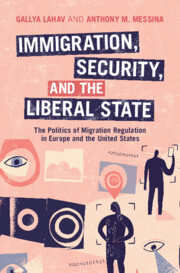 Immigration, Security, and the Liberal State
Immigration, Security, and the Liberal State Book contents
- Immigration, Security, and the Liberal State
- Immigration, Security, and the Liberal State
- Copyright page
- Epigraph
- Contents
- Figures
- Tables
- Preface and Acknowledgements
- 1 Introduction
- 2 Framing and Reframing Immigration
- 3 Expanding the Migration Policy Playing Field
- 4 Popular Attitudes towards Immigration Regulation
- 5 Immigration and the Politics of Threat
- 6 Securitizing and Politicizing Immigration
- 7 Conclusions
- References
- Index
5 - Immigration and the Politics of Threat
Published online by Cambridge University Press: 09 February 2024
- Immigration, Security, and the Liberal State
- Immigration, Security, and the Liberal State
- Copyright page
- Epigraph
- Contents
- Figures
- Tables
- Preface and Acknowledgements
- 1 Introduction
- 2 Framing and Reframing Immigration
- 3 Expanding the Migration Policy Playing Field
- 4 Popular Attitudes towards Immigration Regulation
- 5 Immigration and the Politics of Threat
- 6 Securitizing and Politicizing Immigration
- 7 Conclusions
- References
- Index
Summary
Chapter 5 asks why the public continues to support restrictive policies given their considerable economic and rights costs. It identifies the predominant values informing and facilitating the liberal state’s governance of contemporary immigration and its implications for restricting human mobility by focusing on the effects of a threat environment in sustaining the onerous policies of the migration policy playing field. It argues that the persistence of these policies can largely be explained by the continued negative framing of these events by political elites and the mass media. In particular, their conflation of public safety and national security with immigration makes the issue more salient for the public, and the popular legitimacy of restrictive policies is sustained and endorsed by center and extreme Right politicians and political parties. The chapter concludes that the predominance of a security paradigm has shifted the baseline of values salience and realigned popular values and attitudes regarding immigration.
- Type
- Chapter
- Information
- Immigration, Security, and the Liberal StateThe Politics of Migration Regulation in Europe and the United States, pp. 236 - 261Publisher: Cambridge University PressPrint publication year: 2024
